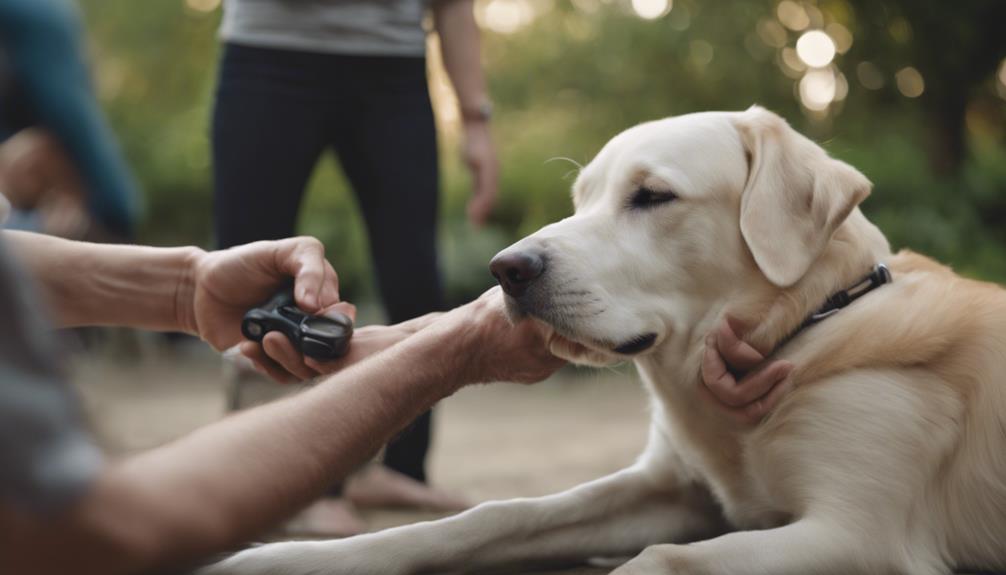
Hypnosis, EFT, and NLP are effective tools for conquering fear or phobia of dogs by addressing root causes and triggers, offering relaxation and fear alleviation. These therapies empower individuals through understanding canine behavior and reshaping fear responses. By combining these techniques, one can experience profound behavioral transformations and build emotional resilience. Seeking professional help for traumatic encounters, using gradual exposure, and customizing treatment plans can facilitate healing. Maintenance involves relaxation strategies, confidence building, and consistent practice for long-term success. Embrace these insights and solutions to overcome your fears and phobias of dogs.
Understanding Fear of Dogs
Many individuals who experience a fear of dogs often find themselves grappling with a deep-seated phobia that can greatly impact their daily lives. This fear can stem from various factors, including past traumatic experiences, lack of exposure to dogs during childhood, or exaggerated media portrayals.
Phobia triggers for dogs can vary from person to person, ranging from specific canine behaviors such as barking or jumping to more generalized fears related to the size or breed of the dog.
Understanding fear responses and canine behavior is vital in addressing this phobia effectively. Canine therapy, which involves controlled exposure to dogs in a safe environment, can help individuals gradually desensitize themselves to their fear. By learning about dog behavior and body language, individuals can feel more empowered and in control when interacting with dogs, reducing their anxiety levels significantly.
Hypnosis for Fear Reduction

For individuals struggling with fear or phobia of dogs, hypnosis and Emotional Freedom Techniques (EFT) offer promising avenues for reducing distress and anxiety.
Hypnosis can help calm the mind and create a sense of relaxation, while EFT targets the specific fears and triggers associated with dogs, providing relief and a path towards overcoming the phobia.
Hypnosis for Calming
In the domain of addressing fear or phobia of dogs, utilizing hypnosis for calming purposes is a method that has shown promising results in reducing anxiety and promoting a sense of tranquility.
Through relaxation techniques incorporated in hypnotherapy sessions, individuals can learn to manage stress responses triggered by the fear of dogs.
Hypnosis enables individuals to enter a state of deep relaxation, allowing them to reframe their thoughts and emotions associated with the fear of dogs.
By focusing on relaxation and stress management during hypnosis sessions, individuals can cultivate a sense of calmness and control when faced with their fear.
This approach can help individuals build resilience and cope effectively with their fear of dogs, fostering a more balanced emotional response.
EFT for Fear Relief
Utilizing Emotional Freedom Techniques (EFT) alongside hypnosis can offer a thorough approach to fear relief. This combination addresses subconscious fears and promotes emotional resilience through targeted interventions. EFT benefits individuals by providing a practical and empowering tool to manage phobia triggers effectively. This combination can help individuals overcome deep-seated fears by accessing and releasing emotional blockages.
The benefits of EFT for fear relief include:
- Providing a non-invasive method for addressing phobias
- Offering a holistic approach to healing emotional wounds
- Teaching individuals self-regulation techniques for anxiety management
- Helping individuals reframe negative thought patterns
- Supporting individuals in building emotional resilience and confidence
EFT Techniques for Phobias

Addressing phobias through Emotional Freedom Techniques (EFT) involves tapping on specific meridian points to alleviate fear responses in a gentle and effective manner. EFT techniques for phobias often include incorporating visualization exercises and Neuro-Linguistic Programming (NLP) reframing to help individuals rewire their responses to fear triggers.
EFT visualization is a powerful tool used to guide individuals in picturing themselves in situations that typically evoke fear, but this time, they visualize themselves feeling calm, in control, and unbothered by the phobia. By repeatedly engaging in this visualization process while tapping on meridian points, individuals can start to reprogram their automatic fear responses.
NLP reframing is another technique often used in conjunction with EFT for phobias. This involves shifting the way individuals perceive their phobia by changing the language they use internally and externally about the fear-inducing object or situation. By reframing the phobia in a more positive or neutral light, individuals can start to diminish the power it holds over them.
NLP Strategies for Behavioral Change

Implementing effective NLP strategies can catalyze profound behavioral transformations in individuals seeking personal growth and development. NLP, or Neuro-Linguistic Programming, offers various techniques that can help individuals overcome fears and phobias such as the fear of dogs. By harnessing the power of communication skills and visual imagery, NLP empowers individuals to reframe their thoughts and behaviors, leading to lasting change.
- Anchoring Techniques: Using anchors to associate positive emotions with dogs can help shift the perception from fear to comfort.
- Swish Pattern: This technique involves replacing negative thoughts with positive ones through visualization, gradually reducing fear responses.
- Meta-Modeling: By identifying and challenging limiting beliefs about dogs, individuals can restructure their thoughts and responses.
- Milton Model: Utilizing language patterns that bypass conscious resistance can facilitate subconscious change in perception.
- Parts Integration: Resolving inner conflicts related to dogs by integrating conflicting parts of oneself can lead to a more harmonious relationship with dogs.
Overcoming Traumatic Dog Encounters

Facing a traumatic dog encounter can be deeply distressing and may result in lasting fear or phobia.
It's important to acknowledge the impact of such experiences and seek appropriate support to heal from them.
Coping strategies and techniques can help individuals navigate their emotions and fears after such incidents.
Healing Dog Phobias
Healing from traumatic dog encounters involves gradually rebuilding a sense of safety and trust in the presence of dogs through targeted therapeutic techniques. Canine therapy and understanding the mind-body connection play essential roles in this healing process.
Here are some practical steps to help overcome dog phobias:
- Gradual Exposure: Slowly introducing controlled interactions with friendly dogs.
- Cognitive Behavioral Therapy: Identifying and challenging negative thought patterns associated with dogs.
- Relaxation Techniques: Learning methods like deep breathing to manage anxiety around dogs.
- Positive Reinforcement: Rewarding oneself for progress made in facing dog-related fears.
- Seeking Professional Help: Consulting therapists or dog behavior specialists for tailored support and guidance.
Coping After Attacks
Recovering from a traumatic dog encounter involves gradually rebuilding a sense of safety and trust, maneuvering the emotional aftermath with resilience and support.
The recovery process after such an event can be challenging, impacting one's mental health greatly. It is essential to seek professional help, such as therapy or counseling, to cope with the psychological effects of the attack.
Developing coping strategies, like mindfulness techniques or relaxation exercises, can aid in managing anxiety or fear associated with the incident.
Building a support system of friends, family, or support groups can also provide a sense of security and understanding during this difficult time.
Combining Therapies for Success

Integrating multiple therapeutic approaches can greatly enhance the efficacy of treatment for overcoming fear or phobia of dogs. By combining techniques such as hypnosis, Emotional Freedom Techniques (EFT), and Neuro-Linguistic Programming (NLP), individuals can address their fears from various angles, leading to a more inclusive and successful outcome.
Here are five ways in which combining therapies can help individuals conquer their fear of dogs:
- Anxiety management: Through a combination of relaxation techniques and cognitive-behavioral strategies, individuals can learn to manage their anxiety responses when faced with dogs.
- Confidence building: By using hypnosis to boost self-confidence, EFT to release negative emotions associated with dogs, and NLP to reframe limiting beliefs, individuals can develop a sense of empowerment when encountering dogs.
- Exposure therapy: Gradual exposure to dogs in a controlled environment, combined with relaxation techniques, can help desensitize individuals to their fear.
- Mind-body connection: Utilizing techniques that address both the mind and body can help individuals create a more balanced approach to overcoming their fear.
- Customized treatment: Tailoring a treatment plan that integrates various therapies based on individual needs and preferences can increase the chances of success in conquering the fear of dogs.
Maintaining Progress and Confidence

Maintaining progress and confidence in overcoming a fear or phobia of dogs involves consistent practice of learned techniques and fostering a mindset of resilience. Celebrating each milestone achieved in the journey towards conquering this fear can provide a significant boost in confidence. It is essential to acknowledge and appreciate the progress made, no matter how small it may seem. This progress celebration serves as a reminder of the efforts put in and the courage displayed.
Self-care practices play an important role in maintaining mental and emotional well-being throughout this process. Engaging in activities that bring joy and relaxation can help in reducing stress and anxiety related to the fear of dogs. Positive reinforcement, both self-imposed and from external sources, can further solidify the sense of accomplishment and boost confidence levels. Remembering the progress made and the resilience shown in facing this fear can serve as a source of motivation to continue moving forward on the path to overcoming it.
Frequently Asked Questions
Can Hypnosis, Eft, and NLP Be Used to Treat Other Phobias Besides the Fear of Dogs?
Yes, hypnosis, EFT, and NLP can effectively treat various anxiety disorders and social phobias beyond just the fear of dogs. These modalities offer valuable tools for addressing and overcoming a wide range of phobias and fears.
Are There Any Potential Side Effects or Risks Associated With Using Hypnosis, Eft, and NLP for Overcoming the Fear of Dogs?
When contemplating any form of therapy, it is essential to evaluate potential risks against benefits to guarantee long-term success. Therapist qualifications, treatment duration, and strategies for preventing recurrence all play crucial roles in overcoming fears effectively.
How Long Does It Typically Take to See Results When Using Hypnosis, Eft, and NLP for Treating a Fear of Dogs?
Treatment duration for overcoming fear of dogs varies based on individual factors but typically ranges from a few weeks to several months. Success rate increases with therapist expertise. Challenges include underlying issues. Choosing a qualified therapist is vital for effective results.
Is It Possible for the Fear of Dogs to Return After Successful Treatment With Hypnosis, Eft, and Nlp?
Fear relapse after successful treatment for the fear of dogs is possible. Prevention strategies include ongoing support, gradual exposure, and coping techniques. Long-term success and maintenance rely on consistent practice, self-awareness, and seeking help if needed.
Are There Any Specific Qualifications or Certifications to Look for in a Therapist Offering Hypnosis, Eft, and NLP for Phobia Treatment?
When seeking therapists for phobia treatment, qualifications and certifications are vital. Look for those with specialized training in hypnotherapy, EFT, and NLP. Success rates, treatment processes, and client testimonials can provide valuable insights into their expertise.
Conclusion
To sum up, the combination of hypnosis, EFT, and NLP techniques can effectively address and resolve the fear or phobia of dogs.
By understanding the root causes of the fear, utilizing these therapeutic approaches, and maintaining progress and confidence, individuals can overcome their traumatic experiences and behavioral patterns.
Embracing a holistic approach to therapy can lead to lasting change and a renewed sense of empowerment in facing fears.
Take the Next Step
Do not be afraid to reach out to me, Mark E Wilkins, to assist you in any issues you might have. Most Hypnotherapy sessions last 2 hours and EFT Sessions are usually handled with one session. Life Coaching is 45 minute session, once a week. Self-Hypnosis is taught in one session, and lasts a lifetime.
To make an appointment, first listen to the Pre-talk and fill out he Complementary Healthcare Provider Disclosure. The use the Contact Form to request an appointment with the Bohol Hypnosis Expert.
Self-help downloads are available. The self-hypnosis program to teach you how to self-hypnotize is here.





